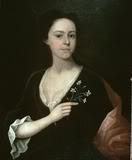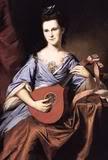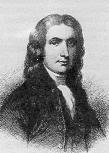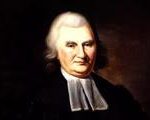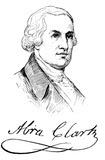Poet and Wife of Declaration Signer Richard Stockton
Annis Boudinot was born July 1, 1736, in Darby, Pennsylvania, to Catherine Williams and Elias Boudinot, merchant and silversmith, who later moved his family to Princeton, New Jersey. She was their eldest daughter and the second of ten children, though the first to be born in North America (her parents had just returned from Antigua where her father had run a plantation).
The Boudinot family settled in Princeton, New Jersey. There Annis was exposed to the intellectual and social circles of the area, and her parents gave her a good education. She became particularly interested in poetry, an unusual pastime for a woman of that time, and published her first poem at age 16: To the Honorable Colonel Peter Schuyler, in the New-York Mercury and New American Magazine.
Young Annis thrived in the town’s stimulating academic atmosphere, and became acquainted with Richard Stockton when her brother, Elias Boudinot, studied law in Richard’s office and married his sister, Hannah Stockton. Elias became a statesman from New Jersey, and was President of the Continental Congress in 1782 and 1783, and a signer of the Treaty of Paris, which ended the Revolutionary War.
Richard Stockton, eldest son of John and Abigail (Phillips) Stockton, was born October 1, 1730. He was educated in the early years by Reverend Doctor Samuel Finley at Nottingham Academy in Maryland, and then attended the College of New Jersey (now Princeton University), graduating in 1748. He studied law under the honorable David Ogden of Newark, at that time the most eminent lawyer in the colony.
Stockton was admitted to the bar in 1754, to the grade of counselor in 1758, and in 1763 he received the degree of Sergeant-at-Law the highest degree of law attainable. He opened his law practice in Princeton in 1754, and later another in Newark. He was Judge of the Supreme Court and a member of the King’s Council for New Jersey before the Revolution.
Sometime in the late 1750s, Annis Boudinot married Richard Stockton, one of the most eloquent lawyers in the colonies. She was a woman of high character and patriotic spirit, which made her a fitting companion for the man who would soon devote his life to the cause of independence.
The Stocktons made a strikingly attractive couple, and they were very happily married and close confidants. They had six children together: Julia (born 1759), Mary and Susan (twins, born 1761), Richard (born 1764), Lucius Horatio (born 1768), and Abigail (born 1773).
Richard Stockton had added materially to the large estate near Princeton he had inherited from his father. The couple built up the house and gardens on their property, and Annis gave the estate the poetic name of Morven, after the ancient Scottish King Fingal’s home. It became a gathering place for the Founding Fathers, and Annis was often called the Duchess of Morven.
In 1766, Richard Stockton left for a sixteen-month stay in England and Scotland, acting as a representative for both the College of New Jersey (later Princeton University) and for the American colonies in general. He argued the colonists’ viewpoint on the taxation issue, but to no avail, and left England convinced that the matter would not be easily resolved. Stockton returned to New Jersey in September of 1767, and resumed his law practice.
Much of Annis’ life was occupied with raising six children and managing a sizeable household. But no matter how demanding those responsibilities became, she continued to make time for poetry. Her husband encouraged her work, and her audience gradually expanded beyond the family circle.
She exchanged verses with Philadelphia poet Elizabeth Graeme Fergusson, and became a close friend of Esther Burr, who preserved two of Annis’ poems in her journal. She wrote a number of odes to George Washington, many of them warmly acknowledged in his letters to her. Although Philadelphia, New York, and New Jersey periodicals printed her verse from time to time, most of her work remained in manuscript.
When the separation of the colonies from Great Britain became inevitable, Richard Stockton became an outspoken advocate of the Patriots, at considerable risk and sacrifice. He resigned from the royal council, comprised mostly of Loyalists and neutral parties, despite many personal friendships among its members.
The Provincial Congress of New Jersey selected Stockton as one of its delegates to the First Continental Congress, which met in Philadelphia. One of five delegates from New Jersey, Stockton was a very active member of Congress. He served on numerous committees with well-known Founding Fathers Thomas Jefferson, Francis Lightfoot Lee and Robert Treat Paine.
Richard Stockton signed the Declaration of Independence in 1776, and became one of the rebel leaders in New Jersey – along with his brothers, the Reverend Philip Stockton and the Honorable Samuel Witham Stockton, and Dr. Benjamin Rush, whom the Stocktons’ oldest daughter Julia married in January 1776, six months before he signed the Declaration.
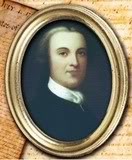
![]()
Stockton and his signature on the
Delcaration of Independence
The Stocktons did not fare well during the Revolutionary War. In November 1776, General George Washington was forced to retreat across New Jersey, and the British under General Charles Cornwallis were headed for Princeton. Congress was then meeting in Baltimore, and Richard hurried home to take his family to a safe place. Annis hurriedly buried important state papers, as well as the papers of the American Whig Society of Princeton College, an act for which she was made an honorary member of the Society. She had to leave behind her beloved books, letters, and poetry.
Richard took Annis and their children to the house of fellow Patriot, John Covenhoven, in Monmouth, New Jersey. While there, on November 30, 1766, Richard and Mr. Covenhoven were arrested by a party of Loyalists. They were dragged from their bed at a late hour, and carried away half-dressed in freezing weather.
Richard was turned over to the British and jailed in Perth Amboy, suffering greatly from the cold. From there, Richard was carried to Provost Prison in New York City. The darkest days of Richard Stockton’s life were spent locked in irons, starving and shivering. Conditions were horrific, and more than 12,000 men died in that prison and on prison ships in New York Harbor.
Being a known signer of the Declaration of Independence, Richard was treated harshly by his captors. Annis informed the Congress of his situation, and they protested this inhumane treatment of a member of that Congress, and asked General Washington to protest to General Howe about the matter. His condition was somewhat improved after that, but his health was already destroyed.
The Stocktons also paid dearly for their revolutionary activities when General Cornwallis reached Princeton. That British officer occupied Morven during the Battle of Princeton in December 1776. The British army ransacked their estate, destroyed valuable papers (including some of Annis’ early poems), and burned the furniture and the library, one of the finest in the colonies. They trashed the house and lands, and drove off their stock, much of which was blooded and highly valuable. Thanks to General Washington’s quick recapture of Princeton, Annis soon returned to Morven, and salvaged what she could.
Richard Stockton paid the supreme price for placing his signature on the Declaration and pledging his life, his fortune, and his sacred honor. Finally, under pressure, the British released him in late January, 1777. One of the requirements of Richard’s parole was an oath of non-participation in the Revolution. He kept his word and withdrew from Congress and from active politics.
Stockton was sick and near death when he returned home. The devastation of the estate and the depreciation in value of the Continental currency forced Richard to ask friends for temporary assistance in order to give his family the necessities of life. This caused a deep depression from which he never rallied. He slowly regained his strength and returned to his law practice in order to support his family, but his health would never be the same.
Richard became very ill with cancer in 1778. Epistle to Mr. S. was one of Annis Stockton’s earliest poems. It originally appeared in the New York Mercury and reveals a period of great sadness in her life – the time of her husband’s extended fatal illness. Her watch by her husband’s deathbed occasioned two of her most moving elegies:
But vain is prophesy when death’s approach,
Thro’ years of pain, has sap’d a dearer life,
And makes me, coward like, myself reproach,
That ere I knew the tender name of wife.
Richard Stockton would not live see his country win independence. He died February 28, 1781. His remains were conveyed to Nassau Hall and eulogized by the President of the College of New Jersey (now Princeton), Dr. Samuel Smith. He was buried at Stony Brook Quaker Cemetery in Princeton, New Jersey, among his Quaker ancestors. In 1913 a bronze marker was placed at the site by the Sons of the American Revolution.
Despite grief and impoverishment, Annis Stockton continued to devote her pen and her energies to the American cause. She would become one of the most published American women writers of the century, with at least twenty-one of her poems appearing in prestigious newspapers and magazines.
With her husband’s death, Annis became the manager of the estate, and supervised the servants, slaves, and daily household matters. She continued as the mistress of Morven, raising her children and retaining a high social standing until 1795, when her eldest son Richard – who had inherited the estate from his father – was married.
Annis then moved to the home of her youngest daughter, Abigail Stockton Field. Her final years were spent there at White Hill, a mansion overlooking the Delaware River in present day Fieldsboro, New Jersey. Susan Stockton, her second daughter, married Alexander Cuthbert of Canada. Mary married Reverend Andrew Hunter, who was a chaplain in the Continental Army and a professor at Princeton.
Annis’ two brothers, Elias and Elisha Boudinot, continued to be active in politics. Elisha was a lawyer and New Jersey Supreme Court Justice from 1798-1804. Elias was a lawyer, a Congressman, the Director of the Mint, and when Congress moved to Princeton in 1783, he resided with his sister at Morven. He had married Richard Stockton’s sister Hannah, bonding the two families closer together.
Annis thus became acquainted with important people of the time, developing a close friendship with the Washingtons. When the war brought General Washington to the area, he always stayed at Morven. She continued to support the rebels and served on a committee of New Jersey women who supported the Patriot soldiers.

Morven: the Stockton Home
Annis Boudinot Stockton was well known throughout the Revolution for her patriotic verse. One of her poems drew a courtly acknowledgment from General Washington to whom it was addressed. Another, Welcome, Mighty Chief, Once More! was sung by the young women of Trenton while Washington was passing through Princeton on his way to his first inauguration.
After the Revolution, a number of her poems, especially the odes to George Washington, were published. Over the years, she published a total of twenty-one poems in contemporary newspapers and magazines. Throughout her life, Annis worked in the couplets and alternately rhymed quatrains of Pope, Young, Thomson and Gray. Using these models, she developed themes of courtship, marriage, nature, friendship, patriotism, old age and grief.
But even as she imitated conventional forms, Annis worried about the propriety of her activities. She confided to her brother Elias in a letter dated May 1, 1789, about one of her odes to Washington:
If you think it will only add one sprig to the wreath the country twines to bind the brows of my hero, I will run the risk of being sneered at by those who criticize female productions of all kinds.
Fearful for her reputation, yet wanting recognition for her work, Annis faced a dilemma common to colonial women poets. The number of her publications and the size of her manuscript collection may indicate that the desire to write finally outweighed her fear of impropriety.
Annis Boudinot Stockton was one of the most prolific and widely published women writers in 18th Century America, Her poems in the English Neoclassical style remain the best known of her 120 works, which also include a play and numerous articles written for the leading newspapers and magazines of her day.
Annis Boudinot Stockton died at White Hill February 6, 1801, at age 64. Her body was taken across the river to Philadelphia and laid in the plot of her son-in-law Dr. Benjamin Rush.
In 1995, her poems were collected and published in Only for the Eye of a Friend: The Poems of Annis Boudinot Stockton, by Carla Mulford.
SOURCES
Annis Stockton
Richard Stockton
Annis Boudinot Stockton
Annis Stockton Biography
Wikipedia: Richard Stockton
Richard Stockton (1730-1781)
Richard Stockton: New Jersey
Biography of Richard Stockton
Annis Boudinot Stockton, Poet
Wikipedia: Annis Boudinot Stockton
